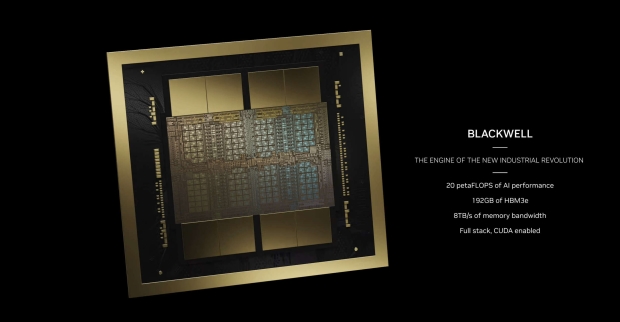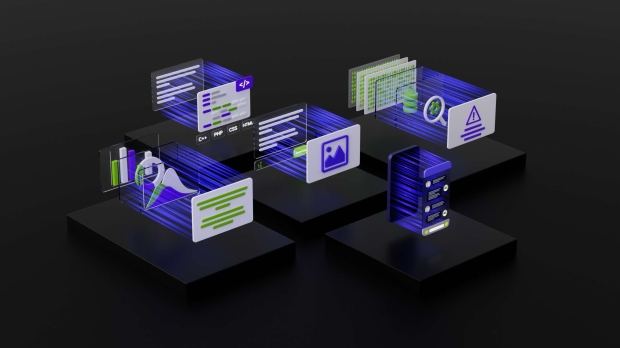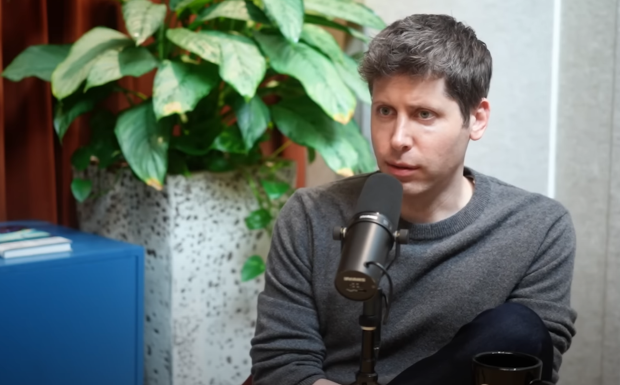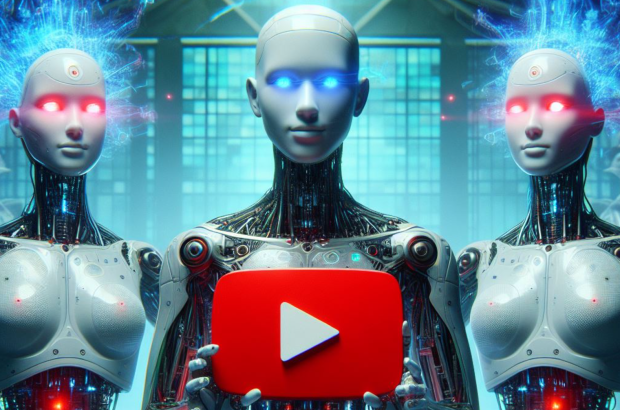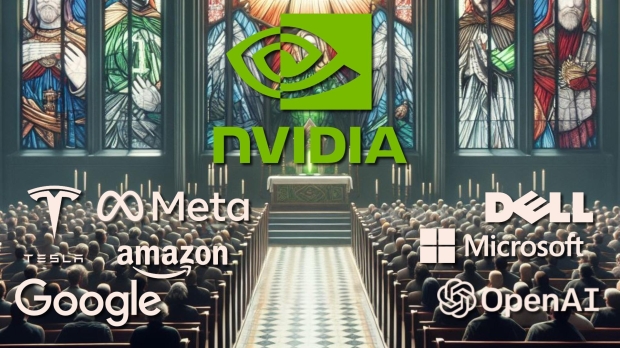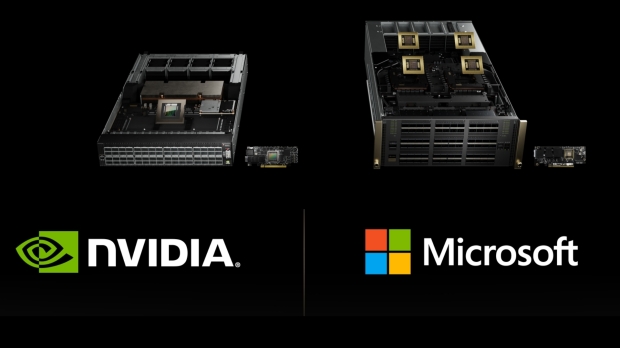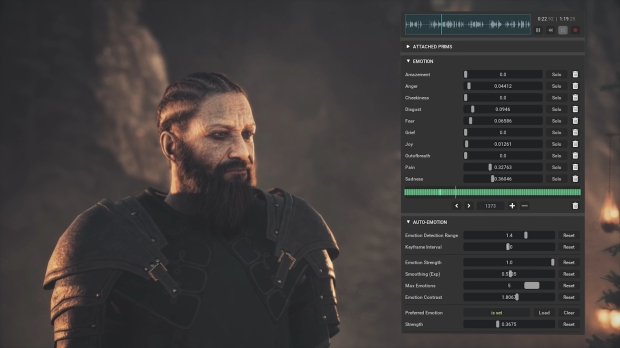Artificial Intelligence News - Page 7
NVIDIA is qualifying Samsung's new HBM3E chips, will use them for future B200 AI GPUs
NVIDIA CEO Jensen Huang told the press during a media briefing at GTC 2024 that "HBM memory is very complicated and the value added is very high. We are spending a lot of money on HBM". Jensen added: "Samsung is very good, a very good company".
SK hynix gobbles up most of the advanced HBM3 and HBM3E memory needs for NVIDIA and its growing arsenal of AI GPUs with the Hopper H100, H200, and new Blackwell B100 and B200 AI GPUs all using HBM memory. Jensen continued: "The upgrade cycle for Samsung and SK Hynix is incredible. As soon as NVIDIA starts growing, they grow with us. I value our partnership with SK Hynix and Samsung very incredibly".
The news directly from the CEO of NVIDIA that it will be using HBM memory supplied by Samsung saw the South Korean company's shares jump by 5.6% on Wednesday.
Meta orders NVIDIA's next-gen Blackwell B200 AI GPUs, shipments expected later this year
Meta has purchased NVIDIA's new Blackwell B200 AI GPUs to train its Llama models, according to Meta CEO Mark Zuckerberg. The company is also training a third-generation of its Llama model on two GPU clusters that it announced last week, each of them packing around 24,000 of NVIDIA's current-gen Hopper H100 AI GPUs.
The news is coming from a new report by Reuters, which said that Meta will continue using its current H100-powered AI GPU clusters to train its current-gen Llama 3 model, but will use NVIDIA's new Blackwell B200 AI GPUs to train future generations of the model, according to a Meta spokesperson.
NVIDIA announced its new Blackwell B200 AI GPU at its GPU Technology Conference (GTC) event this week, offering gigantic improvements to all things AI.
NVIDIA adds generative AI into cuLitho: game-changing 60x speed up for chipmakers like TSMC
NVIDIA announced its new Blackwell GPU at GTC 2024 this week, with the company announcing that TSMC and Synopsys are using its cuLitho software in production to boost computational lithography.
This is an important step that helps chip makers walk around limitations imposed on them as we get into 2nm and smaller transistors produced with next-level machines like ASML's new High-NA EUV lithography machines. The computational power behind these chips continues to skyrocket, which is where NVIDIA and cuLitho steps in.
NVIDIA used an example of a cuLitho-powered system packing 300 x H100 AI GPUs, which provided a gigantic 60x performance increase for a workload that would normally require 40,000 x GPU systems and a mind-boggling 30 million or more hours of compute time.
Sam Altman responds to question asking if he's afraid of AGI taking over
Sam Altman, the CEO of OpenAI, the company behind many popular and powerful AI-powered tools such as ChatGPT, Sora and the underlying technology called GPT, was asked during an interview if he was worried about losing control of AGI once its created.
Altman sat down for an interview with Lex Fridman on the "Lex Fridman Podcast," where he was asked if he worries about "losing control of the AGI itself", as there are many people out there, including numerous security researchers concerned about the creation of a super-intelligent AI system and the implications that has on the planet through existential risk. Fridman prefaces the question by saying that "losing control" would not be because of "state actors, not because of security concerns, but because of the AI itself".
The OpenAI CEO responded promptly by saying, "That is not my top worry as I currently see things." Adding, "there have been times I worried about that more. There may be times again in the future where that's my top worry. That's not my top worry right now." Fridman followed up by asking "What's your intuition about that not being your top worry," adding "do you think we could be surprised?".
OpenAI CEO Sam Altman was asked if he trusts himself with the power of AGI
Sam Altman, the CEO of OpenAI, the company behind GPT-4, ChatGPT, Sora, and many other industry-leading AI technologies, has sat down for an interview with Lex Fridman to discuss multiple topics regarding artificial intelligence and the impressive creations being made at OpenAI.
Lex Fridman asked Altman if he trusts himself with the power of leading a company that could potentially create the first Artificial General Intelligence (AGI), an AI system that is capable of human-level and beyond intelligence. Altman responded honourably to the question, saying that he believes that its important that "I nor any other one person have total control over OpenAI, or over AGI, and I think you want a robust governance system."
The OpenAI CEO further explained that he "continues to not want super voting control over OpenAI" and "I continue to think that no company should be making these decisions and that we really need governments to put rules of the road in place."
YouTube rolls out safeguards to battle the rise of AI generated video
YouTube has taken to its blog to announce a new rule for its platform designed to protect users from being deceived by creators who are trying to pass off their content as authentic when it was created using the assistance of artificial intelligence-powered tools.
With the unveiling of OpenAI's Sora tool, which is designed to create photorealistic video content from user text prompts, and the popularity of ChatGPT, it isn't a reach to say that AI-powered tools such as Sora will be popular when they are fully developed and released.
Some of the video examples provided by Sora creator OpenAI featured tell-tale signs of AI-powered creation, but the vast majority at a glance, or even viewed by the untrained eye, wouldn't raise alarm bells for synthetic creation, further blurring the line between what's real and what's fake on the internet.
Continue reading: YouTube rolls out safeguards to battle the rise of AI generated video (full post)
OpenAI, Microsoft, Amazon, Meta, Google, Tesla, and more are all on the NVIDIA Blackwell train
NVIDIA has unveiled its next-gen Blackwell AI GPU, which features 208 billion transistors, 192GB of super-fast HBM3E memory, a cutting-edge custom TSMC 4NP process, and groundbreaking new networking that sees NVIDIA NVLink deliver 1.8TB/s bidirectional throughput per GPU.
The company also announced its new NVIDIA GB200 Grace Blackwell Superchip, which connects two NVIDIA B200 Tensor Core GPUs to the NVIDIA Grace CPU "over a 900GB/s ultra-low-power NVLink chip-to-chip interconnect." With serious AI horsepower, NVIDIA's powerful next-gen AI hardware arrives during the AI boom, so, unsurprisingly, it announced its long list of Blackwell partners.
NVIDIA writes, "Among the many organizations expected to adopt Blackwell are Amazon Web Services, Dell Technologies, Google, Meta, Microsoft, OpenAI, Oracle, Tesla, and xAI." Even though most, if not all, of these companies are investing in creating their own AI chips and hardware for generative AI-which is used in everything from scientific research to medicine and chatbots-Blackwell will drive many of the advances over the next few years.
Microsoft and NVIDIA to integrate generative AI and Omniverse tech in Azure and Microsoft 365
It's been a massive day for AI news, with NVIDIA's premiere GTC 2024 AI conference underway. Earlier today, the company unveiled its next-gen Blackwell AI GPU - an unprecedented AI monster with 208 billion transistors and 192GB of super-fast HBM3E memory.
NVIDIA's first multi-GPU die is built on a cutting-edge TSMC 4NP process. It allows organizations to run real-time generative AI on "trillion-parameter large language models" at up to 25X less cost and energy consumption than its Hopper predecessor. Throw in the latest version of NVIDIA NVLink that delivers 1.8TB/s bidirectional throughput per GPU, and it's no wonder everyone is signing up to join the Blackwell family - including Microsoft.
Alongside the big Blackwell reveal, NVIDIA and Microsoft have announced that Microsoft Azure will adopt NVIDIA Grace Blackwell Superchips to help accelerate customer and first-party (Microsoft's own) AI offerings, Including Microsoft 365, aka the online versions of Microsoft Word, PowerPoint, Excel, and OneNote. NVIDIA GPUs and NVIDIA Triton Inference Server will help power Microsoft Copilot for Microsoft 365.
NVIDIA Audio2Face uses AI to generate lip synching and facial animation, showcased in two games
Localization is a big thing in gaming, where a game's dialogue and presentation are recorded in various languages to reach a global audience. Like how Netflix dubs all of its original programming into multiple languages, localization for games is a complex process that requires accurately translating dialogue and text, maintaining dramatic or comedic tones, and then re-recording dialogue with voice actors from different countries.
Where games differ from movies or television drama is that all performances are digital and completely malleable, which is why you've got a situation where Sony's PlayStation-exclusive Ghost of Tsushima (which is coming soon to PC) offers both English and native Japanese language options with full lip-syncing and correct facial animation.
Although it's possible to do this for dozens of languages, Ghost of Tsushima limits full lip-synching to two language options due to the task's complexity and the animation involved. This is where generative AI, specifically NVIDIA's Audio2Face technology, will step in.
NVIDIA's Covert Protocol tech demo has you become a detective investigating AI Digital Humans
At GDC 2024, NVIDIA presented a new tech demo for a theoretical detective game, Covert Protocol, created in collaboration with Inworld. If you recall NVIDIA's recent AI collabs, which created cyberpunk-style tech demos featuring AI avatars you can interact with, this takes it all one step further. It presents an old-school adventure game where you're talking to characters to solve a mystery in a brand-new way.
In Covert Protocol, you play a private detective and explore a realistic environment, speaking to 'digital humans' as you piece together critical and key information. The game is powered by the Inworld AI Engine, which fully uses NVIDIA ACE (the technology we've been following over the past year) services to ensure that no two playthroughs are the same.
"This level of AI-driven interactivity and player agency opens up new possibilities for emergent gameplay," NVIDIA writes. "Players must think on their feet and adapt their strategies in real-time to navigate the intricacies of the game world."



